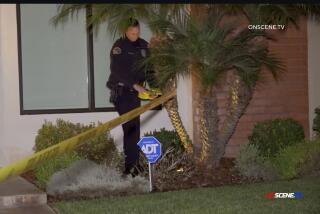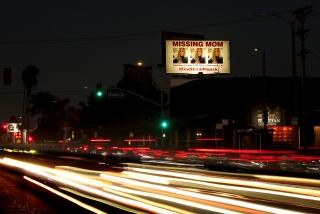Woman Missing for a Week Found Living in Her Van After Suffering Stress Attack
- Share via
WOODLAND HILLS — Anibal Alarcon of Thousand Oaks anxiously bounced a cellular phone on his knee Tuesday afternoon as he sat in a physicians’ room at the Kaiser Permanente Medical Center. His wife, Lidia, who had disappeared a week ago, lay resting in the nearby emergency room after police found her sleeping in her van Tuesday morning.
Alarcon had spent much of the day phoning the small army of relatives and friends he had mobilized to search for his wife, letting everyone know she was safe.
The 45-year-old woman, who had vanished last week after dropping off her younger son at school, had been living in her 1989 Ford Aerostar van on a street in Woodland Hills, apparently suffering an attack of guilt and stress related to an automobile accident last year.
“She had a lot of pressure on herself--she feels like she was trying to get away from it,” Anibal Alarcon said Tuesday night after talking with his wife. “The important thing is, she’s alive.”
Lidia Alarcon was listed in fair condition Tuesday at the medical center. She appeared dehydrated but was otherwise unhurt, her husband said.
She vanished Jan. 9 after taking the couple’s 11-year-old son, Kevin, to Park Oaks Elementary School in Thousand Oaks.
Although family members said she seemed fine the morning of her disappearance, Lidia Alarcon had been plagued by depression after she broke her arm during an accident along California 126 in Ventura last April. She was struck by a car as she walked across the freeway, leading the couple’s insurance company--not Kaiser Permanente--to classify the incident as an attempted suicide, Anibal Alarcon said. She could not recall exact details of the incident, but Alarcon said that he doubted his wife would attempt to take her life.
Lidia Alarcon, who is on disability leave from Whittaker Corp. in Simi Valley, had been in therapy and taking anti-depressant medication since the incident, her husband said.
The burden of thinking that people believed she had tried to kill herself apparently became too much for her, Anibal Alarcon said. After taking her son to school, Lidia Alarcon got on the freeway and kept driving, apparently heading for the Topanga Canyon Road office of a therapist she had been seeing after the accident. Once there, however, Lidia Alarcon remembered that the therapist no longer worked there.
Feeling she could drive no farther, she told her husband that she pulled over onto a side street. She stayed in her car in Woodland Hills for the next week, apparently feeling the need to stay out of contact even with her family. Anibal Alarcon said she purchased supplies--including water, soft drinks and oranges--at a nearby store.
Her family, meanwhile, had grown unhappy with what they considered slow police reaction to her disappearance and enlisted nearly 200 neighbors and friends to search for her.
They handed out fliers in the family church and searched roads from Santa Barbara to Topanga Canyon. Anibal Alarcon even checked with the Mexican Embassy to see if she might have crossed the border, because the couple had traveled there on vacation before. Los Angeles police responded before 9:30 a.m. Tuesday to a report of someone living in a van in a residential section of Woodland Hills.
“The neighbors thought, ‘That van doesn’t belong here,’ so they called the police,” said Det. Thomas Bennett with the Ventura County Sheriff’s Department.
Her older son, Johann Alarcon, 19, received word about his mother being located after his family paged him during an anthropology class at Moorpark College. He rushed home to find that the rest of the family had already driven to the hospital.
“I feel good,” he said from his home. “At least the pressure’s off. At least there’s no bad news out of this.”
The family had not heard from Lidia Alarcon in the week since she disappeared. But they had received several strange phone calls, Johann said, in which someone would call and stay on the other end of the line without speaking.
Anibal Alarcon thanked those friends who had given his family their time and support. “Let me tell you, we’ve never had more than 20 people in the house [before],” he said. “It was always full . . . If it weren’t for them, this would have been the worst nightmare.”
More to Read
Sign up for Essential California
The most important California stories and recommendations in your inbox every morning.
You may occasionally receive promotional content from the Los Angeles Times.













